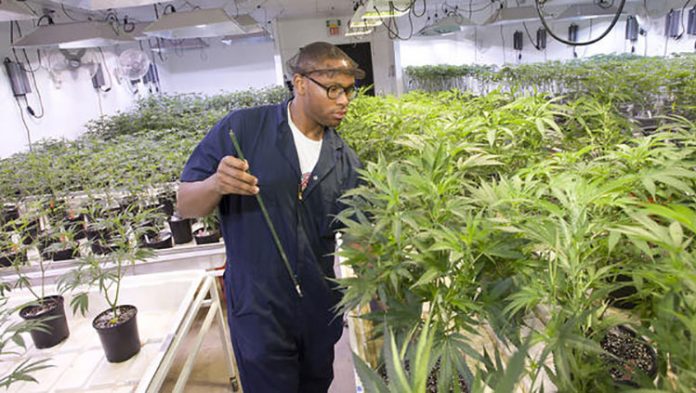Maryland lawmakers ran into controversy immediately Monday as they opened debate on how to reshape the state’s medical marijuana industry to include cannabis firms led by African-Americans.
While General Assembly and marijuana industry leaders widely agree it’s unacceptable that none of the 15 lucrative licenses to grow marijuana are held by minority-owned companies, the passage of a compromise designed to fix that appears contentious.
The compromise, negotiated by legislative and industry leaders since last spring, would create five new growing licenses but stop further expansion of the growing industry for as long as 10 years.
Lawmakers doubted state regulators could move fast enough to get minority firms off the ground and competitive with current growers, which have been working for more than a year and started distributing product just six weeks ago.
And lawmakers also questioned whether a proposed 10-year moratorium on other new growing licenses was too generous a protection for the existing growers, who say they need the stability to establish Maryland’s multi-million medical pot industry.
The debate has the potential to delay the ambitious timeline proposed by the Legislative Black Caucus to pass the emergency legislation and get it onto Gov. Larry Hogan’s desk by the end of the month.
Del. Cheryl D. Glenn, a Baltimore Democrat and chair of the caucus, said she asked to have Monday’s hearing scheduled on Martin Luther King Day as a “really symbolic gesture” to the black community. Expanding diversity in the state’s fledgling medical marijuana industry is a top priority of the influential, 51-member voting bloc for the second year in a row. A previous effort failed as the 2017 General Assembly session ended.
“For generations, the African-American population has been disproportionately impacted by the marijuana laws,” Glenn told her colleagues on the House and Government Operations Committee. “We are very committed that Maryland be a role model state for ensuring … diversity in this multi-billion industry.”
Glenn brought prominent Baltimore City attorney William H. “Billy” Murphy to help her press the case that the General Assembly must include black business owners in the legal growing industry as soon as possible.
“The time is now for this, and it is ironic that those who have been disproportionately arrested, prosecuted and incarcerated for the use of marijuana did not have a chance as a community to participate in this industry,” Murphy said. “We’ll be starting from the ground floor, so the sooner we can get this done, the better the African- American community will be.”
The launch of Maryland’s medical marijuana industry has been beset by delays, lawsuits and discord over who received licenses and whether they were awarded fairly. Two lawsuits threatening to upend the industry are still pending in Baltimore City Circuit Court.
Marijuana sales began Dec. 1, but with just three growers providing product and a handful of dispensaries open for business. Patient advocates, growers and regulators say that it will be months before supply can start to meet demand for the 19,000 patients registered in Maryland so far.
The proposed legislation would add five new growing licenses in Maryland, raising the cap from 15 to 20.
If a diversity study now being done by the Hogan administration demonstrates African-Americans were at a disadvantage in getting into the medical marijuana business, the legislation would call for those five new licenses to be awarded in a race-conscious manner. The study is a legal prerequisite for the state to take into account the race of applicants when choosing winners.
But the proposed new law also calls for a new application process for the new licenses, which Maryland Medical Cannabis Commission Chairman Bryan Lopez said could take as long as 12 months to develop. It could take another six months to evaluate the applicants, which Lopez called a conservative estimate.
Del. Terri L. Hill, a doctor and Democrat from Baltimore County, told Lopez she thought that was too long.
“I’m very concerned about the timeline that you’re mapping out, and I’m very concerned about people who haven’t been part of the game,” she said.
Lopez, who was put in charge of the beleaguered cannabis commission this summer when Hogan replaced 12 of the 16 sitting commissioners, asked state delegates to make a list of changes to the Black Caucus’ proposal — including not replacing him and shrinking the size of the commission starting on June 1.
“It would be unbelievably disruptive to the market,” he said.
Jake Van Wingerden, president of SunMed Growers in Cecil County and president of the Maryland Wholesale Medical Cannabis Trade Association, agreed and asked that the current commission stay on for at least year.
Wingerden also said the moratorium would help the industry get up and running, saying “It will offer peace in the industry.”
He said today’s supply problems will be short-lived.
“It just started. We’re in our infancy,” he said. “What’s out there in the marketplace right now is just the tip of the iceberg.”
But Paige Cohen, who runs the Hippocratic Growth dispensary in Chestertown with her sister, said the proposed decade-long moratorium on new growing businesses was just a way to limit competition and enrich the small pool of growers.
“If you ask the Coca-Cola Company if we should get rid of the Pepsi company, what do you think they would say?” Cohen asked.
The proposed medical marijuana legislation also would create a “compassionate use” fund to help low-income patients and veterans pay for the drug. Medical marijuana is not covered by insurance.
The Maryland General Assembly reconvened last week, and a Senate hearing on the medical marijuana proposal has not yet been scheduled.














